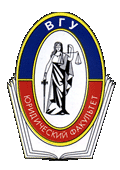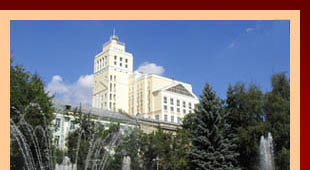|
Faculty / Science / Journal «Judicial authority and criminal process» / Publication ethics
International standards (position statement developed at the 2nd World Conference on Research Integrity, Singapore, July 22–24, 2010; international standards established by the Committee on Publication Ethics (COPE)) and regulations of the Chapter 70 «Copyright» of the Civil Code of the Russian compose the legal basis for publication ethics ensurance.
Editors of «Judicial authority and criminal process» guarantee adherence of:
- scientific paper publication ethics;
- scientific paper authorship ethics;
- scientific paper peer review ethics;
- scientific paper editorial ethics.
Editors of «Criminology Journal of Baikal National University of Economics and Law» (Editors):
- quarantee consideration of all submitted materials; guarantee the Editors’ independence and integrity in decision-making without any prejudice towards authors because of national or religious background or position, regardless of commercial interests and relations with Journal publishers and owners and basing on respect for authors’ personal rights and intellectual property right;
- implement Journal’s policy to ensure and maintain a high standard in the scholarly literature the Editorial ensure that all published papers make a substantial new contribution to the field; strive to ensure the quality of the material published and maintain the integrity of the published record; strive to satisfy readers’ and authors’ needs;
- timeliness, importance, clarity, reliability and soundness of published material are set as guiding principles of editorial activity.
- Main principles of published materials’ high quality are as follows:
- soundness: the research being reported should have been conducted in an ethical and responsible manner and follow all relevant legislation; Authors should take collective responsibility for their work and for the content of their publications;
- honesty: researchers should present their results honestly and without fabrication, falsification or inappropriate data manipulation;
- unambiguousness: publications should provide sufficient detail to permit experiments to be repeated by other researchers;
- completeness of presented materials: reports of research should be complete. They should not omit inconvenient, inconsistent or inexplicable findings or results that do not support the authors’ or sponsors’ hypothesis or interpretation;
- balance: new findings should be presented in the context of previous research;
- originality: authors should adhere to publication requirements that submitted work is original and has not been published elsewhere in any language. Work should not be submitted concurrently to more than one publication;
- transparency: all sources of research funding, including direct and indirect financial support, supply of equipment or materials, and other support (such as specialist statistical or writing assistance) should be disclosed.
- Implement Journal’s policy to identify suitably qualified editorial board members who can actively contribute to the development and good management of the journal.
- Implement Journal’s policy of constant improvement of review institutions, editorial process and materials’ expert review that ensures that peer review is fair, unbiased and timely.
- Ensure that readers are informed about who has funded research or other scholarly work.
- Ensure adherence of published materials; screen for plagiarism, duplicate or redundant publication by using anti-plagiarism software, or for image manipulation.
- Make the final decision on acceptance or nonacceptance of a paper to be published basing on all comments of peer reviewers. The final editorial decision and reasons for this are communicated to authors.
Researchers (paper authors):
- should ensure that only those individuals who meet authorship criteria (i.e. made a substantial contribution to the work) are rewarded with authorship and that deserving authors are not omitted;
- all authors should agree to be listed and should approve the submitted and accepted versions of the publication. Any change to the author list should be approved by all authors including any who have been removed from the list;
- all authors should have read and be familiar with the reported work and should ensure that publications follow the principles set out in these guidelines;
- authors should work with the editor or publisher to correct their work promptly if errors or omissions are discovered after publication;
- authors of material have a responsibility to inform the journal promptly if they become aware that the paper submitted, approved for publication or already published requires correcting;
- authors are not allowed to copy references from other publications if they have not read the cited work; authors should represent the work of others accurately in citations and quotations;
- relevant previous work and publications, both by other researchers and the authors’ own, should be properly acknowledged and referenced. The primary literature should be cited where possible; replication of previous works and their paraphrasing are not allowed: they may be used only as foundation for new conclusions;
- data, text, figures or ideas originated by other researchers should be properly acknowledged and should not be presented as if they were the authors’ own. Original wording taken directly from publications by other researchers should appear in quotation marks with the appropriate citations;
- applicable copyright laws and conventions should be followed. Copyright material (e.g. tables, figures or extensive quotations) should be reproduced only with appropriate permission and acknowledgement.
- Editors guarantee independent peer review conducted the way that ensures honesty and objectivity of comment on scientific value of the paper considered for publication.
- According to the Journal’s policy Editors set peer review process of materials submitted for publication.
- Editors ensure fair and proper rocess of peer review.
- Editors may reject a paper without peer review when it is deemed unsuitable for the journal’s readers or is of poor quality. This decision should be made in a fair and unbiased way. The decision should only be based on the Journal’s editorial policy.
- Editors use appropriate peer reviewers for papers that are considered for publication by selecting people with sufficient expertise and avoiding those with conflicts of interest
- Peer reviewers are told what is expected of them and informed about any changes in editorial policies.
- If serious concerns are raised by reviewers about the validity or reporting of academic work, editors allow authors to respond to the concerns.
- Editors protect the confidentiality of authors’ material and remind reviewers to do so as well. Editors should not give any indication of a paper’s status with the journal to anyone other than the authors.
- Editors protect reviewers’ identities.
- Editors are in a powerful position by making decisions on publications, which makes it very important that this process is as fair and unbiased as possible, and is in accordance with the academic vision of the particular journal.
- All editorial processes are described in Information for authors; requirements for authors, types of materials to be published and how papers are handled by the journal.
- When genuine errors in published work are pointed out by readers, authors, or editors, which do not render the work invalid, a correction (or erratum) should be published as soon as possible. The online version of the paper may be corrected with a date of correction and a link to the printed erratum. If the error renders the work or substantial parts of it invalid, the paper should be retracted with an explanation as to the reason for retraction (i.e., honest error).
- In the end of peer review process Editors take relevant measures with proper comment explaining results of the review.
- Editors must respond to all allegations or suspicions of research or publication misconduct raised by readers, reviewers, or other editors.
- Editors must provide authors with list of requirements. Guidelines are to be updated on regular basis. Editors work in accordance to the system of identity ensurance.
- Retracted papers are retained online, and they are prominently marked as a retraction in all online versions. Editors receive information on problems arose and makes decision on paper’s acceptance for publication or its nonacceptance. The final editorial decision and reasons for this should be clearly communicated to authors and reviewers.
- Editorial conflicts of interests should be declared, ideally publicly. Editors should not be involved in decisions about papers in which they have a conflict of interest.
|







